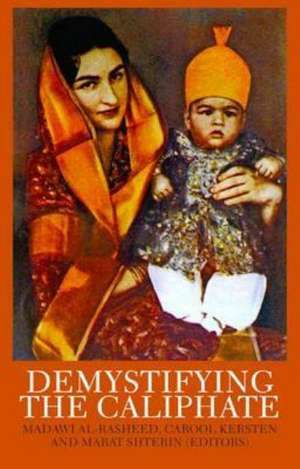Demystifying the Caliphate
en Limba Engleză Paperback – sep 2012
Yet the Caliphate can be evoked as a powerful rallying call and a symbol that draws on an imagined past and longing for reproducing or emulating it as an ideal Islamic polity. The Caliphate today is a contested concept among many actors in the Muslim world, Europe and beyond, the reinvention and imagining of which may appear puzzling to most of us. Demystifying the Caliphate sheds light on both the historical debates following the demise of the last Ottoman Caliphate and controversies surrounding recent calls to resurrect it, transcending alarmist agendas to answer fundamental questions about why the memory of the Caliphate lingers on among diverse Muslims.
From London to the Caucasus, to Jakarta, Istanbul, and Baghdad, the contributors explore the concept of the Caliphate and the re-imagining of the Muslim ummah as a diverse multi-ethnic community.
Preț: 170.31 lei
Preț vechi: 212.54 lei
-20% Nou
Puncte Express: 255
Preț estimativ în valută:
32.59€ • 33.90$ • 26.91£
32.59€ • 33.90$ • 26.91£
Carte disponibilă
Livrare economică 24 martie-07 aprilie
Preluare comenzi: 021 569.72.76
Specificații
ISBN-13: 9781849042284
ISBN-10: 1849042284
Pagini: 324
Dimensiuni: 216 x 141 x 20 mm
Greutate: 0.44 kg
Ediția:New ed
Editura: C Hurst & Co Publishers Ltd
ISBN-10: 1849042284
Pagini: 324
Dimensiuni: 216 x 141 x 20 mm
Greutate: 0.44 kg
Ediția:New ed
Editura: C Hurst & Co Publishers Ltd
Notă biografică
Madawi Al-Rasheed is Professor of Anthropology of Religion at King's College London. Her publications include Kingdom without Borders (Hurst 2008). Carool Kersten is Lecturer in the Study of Islam and the Muslim World at King's College London. He is the author of Cosmopolitans and Heretics (Hurst 2011). Marat Shterin is Lecturer in Sociology of Religion at King's College London. He has published widely on religion, society and law in Russia.
Recenzii
'Contemporary publicity about the caliphate conceals both its historical complexity and its regional diversity. How to exhume skeletons of the past while also silencing sirens from the present? With scholarly aplomb, the dispassionate contributors of this extraordinary volume reveal the benefits, but also the limits, of the cultural capital that informs the social imaginary of multiple Muslim audiences when they evoke, or hear others evoke, the caliphate.' - Bruce B. Lawrence, Professor of Islamic Studies Emeritus, Duke University 'This is a book of exceptional scope and erudition that is nevertheless accessible and very timely. By bringing together such a wealth of regional expertise it succeeds admirably in living up to the promise of its title. More than that, these essays throw new light on the many ways in which even a mythical caliphate can exercise a powerful hold on contemporary political imaginations.' - Charles Tripp, Professor of Middle East Politics, School of Oriental and African Studies, University of London 'This volume is a fascinating treatment of the subject of Islamic Caliphate on which much ink has been spent, particularly in the highly charged and politicised environment of recent times in studies of global Islam.' - - Dr Zaheer Kazmi, St Antony's College, Oxford University 'This collection of erudite and topical studies demonstrates that the caliphate's appeal as a symbol of Muslim unity is as enduring as it is widespread. From the Arab lands to Southeast Asia, from majority to minority Muslims, the idea has taken diverse forms and encountered inhibiting political conditions, but it retains a powerful resonance that should not be ignored.' - James Piscatori, Durham University 'This is an illuminating and timely set of essays showing how visions of a golden age have been continuously marshalled and contested, from once colonised lands across Asia, to the former Ottoman realm and, now, in the increasingly diverse west itself. While caliphs abound, it seems that global consensus on the caliphate itself is yet to emerge.' - Michael Laffan, Professor of Southeast Asian History at Princeton University









